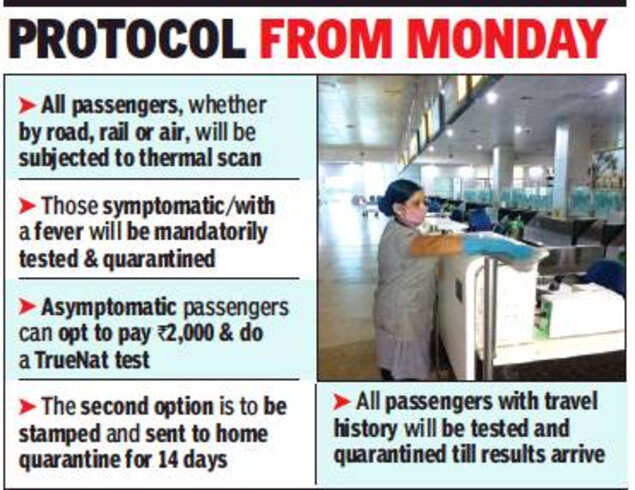
PANAJI: The state government said on Saturday that every individual entering Goa from Monday — whether by flight, rail or road — will either have to undergo a TrueNat test for the novel coronavirus, or agree to a 14-day home quarantine. The new norms formthe Goa government’s protocol for all those entering the state, whether Goan or otherwise.
With domestic flights set to land at Goa International Airport, Dabolim, on Monday, and more trains set to chug into Goa from June 1, the state has drafted the health screening protocol to deal with the huge influx of passengers in the coming week.

“The first option is to get the Covid-19 test done,” health secretary Nila Mohanan told reporters.
“We will take the swab and the person has to pay Rs 2,000 to cover the cost of the test. The second option is a 14-day home quarantine, with a stamp,” she said.
Thus, every individual arriving in the state will have to first undergo thermal screening at the border checkpost, railway station or airport. If the person has a fever, they will be taken for mandatory testing.
Those who do not have a fever will be given the two options, which have to be indicated in a self-declaration form that has to be submitted at the entry point, the health secretary said.
When asked about the possibility of a person transmitting the virus during the quarantine period, Mohanan admitted that there is a small element of risk involved, but she also pointed out that quarantining a large number of people on a daily basis is not practical.
“Quarantining is a burden in terms of getting infrastructure and manpower, because a whole lot of manpower is required for it,” she said.
“What we are interested in is taking their swab and testing it on the same day. We will let them go after that and if required, immediately contact them. For those who opt for testing, part of the declaration is that they will maintain in isolation till test results come.”
The government said it would keep close tabs on those who opt for home quarantine, with their names shared with medical officials. These officials, along with local governing authorities and Goa police, will monitor and follow up with those quarantined at home. “At the end of the quarantine they will not be tested because that is not part of the protocol,” Mohanan said. “Through the 14 days, they will be contacted by medical officials and checked for symptoms.”
A tweet by health minister Vishwajit Rane created a bit of confusion. “We shall also be relying on a Covid-19 negative certificate from a recognized laboratory for people boarding flights, from their respective state. This will help in preventing community transmission and go a long way in keeping Goa safe,” said Rane. When asked about this statement, Mohanan said, “What I have told you is the decision taken by the government, which the SEC has empowered me to share with you”.
However, the protocol announced by the Goa government on Saturday will not affect expats and seafarers who are being rescued and brought back to Goa on flights or by ships, Mohanan said.
Ever since the Centre announced the resumption of domestic flights, there have been questions and concerns about Goa’s protocol for passengers, and the precautions to be taken to prevent community transmission.
With domestic flights set to land at Goa International Airport, Dabolim, on Monday, and more trains set to chug into Goa from June 1, the state has drafted the health screening protocol to deal with the huge influx of passengers in the coming week.

“The first option is to get the Covid-19 test done,” health secretary Nila Mohanan told reporters.
“We will take the swab and the person has to pay Rs 2,000 to cover the cost of the test. The second option is a 14-day home quarantine, with a stamp,” she said.
Thus, every individual arriving in the state will have to first undergo thermal screening at the border checkpost, railway station or airport. If the person has a fever, they will be taken for mandatory testing.
Those who do not have a fever will be given the two options, which have to be indicated in a self-declaration form that has to be submitted at the entry point, the health secretary said.
When asked about the possibility of a person transmitting the virus during the quarantine period, Mohanan admitted that there is a small element of risk involved, but she also pointed out that quarantining a large number of people on a daily basis is not practical.
“Quarantining is a burden in terms of getting infrastructure and manpower, because a whole lot of manpower is required for it,” she said.
“What we are interested in is taking their swab and testing it on the same day. We will let them go after that and if required, immediately contact them. For those who opt for testing, part of the declaration is that they will maintain in isolation till test results come.”
The government said it would keep close tabs on those who opt for home quarantine, with their names shared with medical officials. These officials, along with local governing authorities and Goa police, will monitor and follow up with those quarantined at home. “At the end of the quarantine they will not be tested because that is not part of the protocol,” Mohanan said. “Through the 14 days, they will be contacted by medical officials and checked for symptoms.”
A tweet by health minister Vishwajit Rane created a bit of confusion. “We shall also be relying on a Covid-19 negative certificate from a recognized laboratory for people boarding flights, from their respective state. This will help in preventing community transmission and go a long way in keeping Goa safe,” said Rane. When asked about this statement, Mohanan said, “What I have told you is the decision taken by the government, which the SEC has empowered me to share with you”.
However, the protocol announced by the Goa government on Saturday will not affect expats and seafarers who are being rescued and brought back to Goa on flights or by ships, Mohanan said.
Ever since the Centre announced the resumption of domestic flights, there have been questions and concerns about Goa’s protocol for passengers, and the precautions to be taken to prevent community transmission.
Quick Links
Kerala Coronavirus Helpline NumberHaryana Coronavirus Helpline NumberUP Coronavirus Helpline NumberBareilly NewsBhopal NewsCoronavirus in DelhiCoronavirus in HyderabadCoronavirus in IndiaCoronavirus symptomsCoronavirusRajasthan Coronavirus Helpline NumberAditya ThackerayShiv SenaFire in MumbaiAP Coronavirus Helpline NumberArvind KejriwalJammu Kashmir Coronavirus Helpline NumberSrinagar encounter
Get the app








